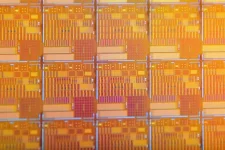FMC joined forces with Neumonda to bring new memory chips to market. These chips act like normal computer memory but keep data safe when turned off. Regular memory loses everything without power, but these special chips hold information forever. The companies call their creation "DRAM+" because it works as fast as normal memory with added benefits. They changed the basic parts inside memory cells, replacing standard parts with special materials that remember electrical states.
This new memory fills the gap between super-fast chips that forget everything and slower storage that remembers but works at turtle speed. Past European memory makers failed because they couldn't compete on price with big Asian factories. These new chips target special uses where keeping data without power matters more than rock-bottom prices. Old versions of this technology hit limits at small sizes, but the new approach works much better at tiny scales.
The companies built test chips that pack billions of memory cells, matching what major manufacturers can make today. Their design needs less electricity because it skips the constant refreshing that normal memory requires. The technology helps computers that process AI data, car systems that must start instantly, and medical devices inside the body where battery life matters. Neumonda brings special testing equipment that costs much less than standard chip-testing machines.
Neither company announced when you can buy products with this technology. The partnership combines FMC's memory design with Neumonda's testing abilities. This memory technology solves problems for devices needing both speed and permanent storage. The chips work thousands of times faster than flash memory cards or solid-state drives. Engineers can build smaller, more efficient computers with these special memory chips.
The technology gives manufacturers a way to create devices that boot instantly from power-off states. Companies like Samsung, Micron, and SK Hynix might license or adopt similar approaches as demand grows for efficient computing. The partnership marks an important step toward practical non-volatile memory that matches DRAM speeds without constant power drain. Smaller companies often pioneer technologies later adopted by industry giants when proven successful.
This new memory fills the gap between super-fast chips that forget everything and slower storage that remembers but works at turtle speed. Past European memory makers failed because they couldn't compete on price with big Asian factories. These new chips target special uses where keeping data without power matters more than rock-bottom prices. Old versions of this technology hit limits at small sizes, but the new approach works much better at tiny scales.
The companies built test chips that pack billions of memory cells, matching what major manufacturers can make today. Their design needs less electricity because it skips the constant refreshing that normal memory requires. The technology helps computers that process AI data, car systems that must start instantly, and medical devices inside the body where battery life matters. Neumonda brings special testing equipment that costs much less than standard chip-testing machines.
Neither company announced when you can buy products with this technology. The partnership combines FMC's memory design with Neumonda's testing abilities. This memory technology solves problems for devices needing both speed and permanent storage. The chips work thousands of times faster than flash memory cards or solid-state drives. Engineers can build smaller, more efficient computers with these special memory chips.
The technology gives manufacturers a way to create devices that boot instantly from power-off states. Companies like Samsung, Micron, and SK Hynix might license or adopt similar approaches as demand grows for efficient computing. The partnership marks an important step toward practical non-volatile memory that matches DRAM speeds without constant power drain. Smaller companies often pioneer technologies later adopted by industry giants when proven successful.












